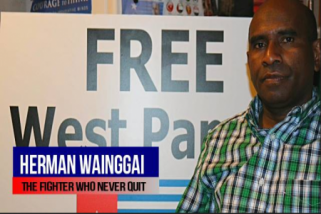Interview With Herman Wanggai, Visiting Scholar and a Leader of a Non-Violent Movement for West Papua Autonomy
Interview With Herman Wanggai, Visiting Scholar and a Leader of a Non-Violent Movement for West Papua Autonomy
 Indonesia absorbed the region known as West Papua in 1969 following the withdrawal of the Dutch colonial administration. This development has resulted in a protracted conflict over freedom and autonomy between the Indonesian Government and some indigenous populations of West Papua.
Indonesia absorbed the region known as West Papua in 1969 following the withdrawal of the Dutch colonial administration. This development has resulted in a protracted conflict over freedom and autonomy between the Indonesian Government and some indigenous populations of West Papua.
What are some of the challenges that you have faced in your struggle for freedom in West Papua?
Torture, long term imprisonment, and death are some of the consequences political activists and their families face every day in our fight for self-determination. Growing up in the 1970s, I heard tons of sad stories, and then came to witness many heartbreaking events. When I stepped into the role of an activist, I was arrested and served time in jail and experienced firsthand the horrible treatment of political prisoners. Now, younger activists are also in jail, going through the same treatment I did. The sad thing is that most of them are being arrested under false charges.
Why do you think Indonesia is doing this?
They do not want to give the West Papuan pro-independence movement a chance, knowing that if West Papuans get the opportunity to vote for self-determination it will be the last time they [Indonesia] will be able to occupy our lands. They denied our right to the kinds of freedom enjoyed by our fellow Pacific Islanders – including Australia and New Zealand – for far too long. All of these actions by Indonesia are designed to keep West Papuans at bay. Every president after Suharto, even though the Indonesian government has gone through internal shake-ups, has maintained this military approach toward West Papuan demands for self-determination even after 53 years since the occupation.
What are some of the next steps that you and other leaders are taking in your struggle?
Freedom cannot be achieved if there is no intervention from the international community. We don't want to fight; we want our vote – we want to exercise our legal rights to vote for our future. Our last hope is for our neighbors – not only the Melanesian leadership but Micronesians and Polynesians as well – to take up the lead. So far, the politics within Melanesia and the free cash from Indonesia has hampered our appeal to our Melanesian brothers and sisters in Melanesia, and to this day the leadership is still in limbo. They simply danced around the issues and often downplayed the urgency of the situation in West Papua. While most support our people, the most influential governments and economic leaders in Melanesia remain uncertain. Today, I’m reading what is going on with the Pacific Islands Forum (PIF) but I see little progress when its comes to people. We appealed to the PIF back to 2000 and in 2002, but up until now, there’s little tangible support to show from these leaders. We, however, see that there’s a huge support for West Papua within the leadership of the PIF and the people in general. They too want to see something done about West Papua. There’s wide support for West Papua throughout the Pacific Islands; peaceful rallies from Samoa to New Zealand, PNG to the Solomon Islands, Fiji and Tonga. We know our brothers and sisters in the Pacific want something done about our situation, how about you leaders? PIF continues to miss great opportunities to make a difference. PIF leaders need to stand up and push the West Papuan case before the United Nations and urge the “Free World” to give us what was denied to us in 1969 – a referendum for self- determination, or the right to determine what our future should look like.
How are foreigners who visit West Papua treated?
A lot of their interactions with foreigners is based on paranoia. An example of this is when a young Spanish tourist visiting Indonesia transited in Jayapura hoping to cross the border to Papua New Guinea within a day or two. There was a rally being held where he was staying, and out of curiosity he decided to explore. Little did he know he was being watched. As he stopped to speak to protesters, police officers arrested him and he was hauled to the police station where he was interrogated until the next day. When they did not find any connection between him and the rally, officers informed him they had turned over all his personal information to police and the media all over West Papua and Indonesia. Well, the rally was in support of West Papuan membership of the Melanesian Spearhead Group (MSG), and that his presence there raised red-flags among Indonesian intelligence officers.
What are some of the steps that the international community are taking in this conflict?
Academics have written about our struggle providing important data about the deaths, abuses, and illegal imprisonment of ordinary West Papuans, but to this day the world pretends nothing is there to see. So much crime committed against our people and no one seemed to ask why. It’s been years since Indonesia banned journalists from visiting West Papua and the reason is Indonesia doesn’t want reporters in West Papua to tell the world what's going on. They don’t want their mass arrests, execution, and imprisonment of innocent people reported to the world.




